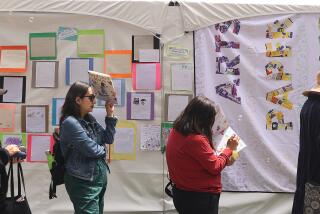MacArthur winner Jesmyn Ward writes socially conscious works set in the South
A breath away from giving up on writing, Jesmyn Ward was researching nursing programs when she received one of five Stanford Stegner fellowships in fiction in 2008.
“I almost gave up,” she told The Times. Winning the Stegner “was amazing, like winning the lottery,” she said.
And yet her accolades stem not from chance, but in response to her prodigious talent: The book she wrote during her two years in the Stegner program, “Salvage the Bones,” went on to win the National Book Award in 2011, and now, as her latest novel, “Sing, Unburied Sing,” is a contender for this year’s National Book Award, Ward has been named a 2017 MacArthur Foundation fellow, the prestigious honor often called the “genius” grant.
Ward chronicles the stories of poor, rural Southerners, invoking racial history and examining present racial divides, in lyrical novels and nonfiction rooted in Mississippi’s Gulf Coast, where she was raised and still lives. In a review of “Sing, Unburied, Sing” for The Times, Michelle Dean called her “an excellent writer of brief but socially and intellectually ambitious novels,” specifying that “there is something about her depiction of the working class, in particular, that seems lived-in, in a way that feels desperately needed in the cohort of Big American Books.”
“Salvage the Bones” reckons with the aftermath of Hurricane Katrina; “Sing, Unburied, Sing” with the ghosts of inherited trauma. Like her first book, 2008’s “Where the Line Bleeds,” the voices in Ward’s work are often those of young people or children. In the memoir “Men We Reaped,” Ward traces the lives and early deaths of five young Mississippi men, including her brother, Joshua. Of that book, Hector Tobar wrote in The Times that “Ward is one of those rare writers who’s traveled across America’s deepening class rift with her sense of truth intact.”
“I wanted to write about the experiences of the poor and the black and the rural people of the South,” she told the audience of the National Book Award ceremony after her win, “so that the culture that marginalized us for so long would see that our stories were as universal, our lives as fraught and lovely and important as theirs.”
Ward won a Strauss Livings prize in 2016, which awards $200,000 to provide writers the freedom to devote time exclusively to writing. The 2017 MacArthur Fellowship is an unrestricted grant of $625,000 intended to facilitate future work.
More to Read
Sign up for our Book Club newsletter
Get the latest news, events and more from the Los Angeles Times Book Club, and help us get L.A. reading and talking.
You may occasionally receive promotional content from the Los Angeles Times.







